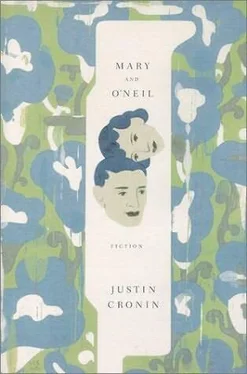“We sold it to a couple with kids,” O’Neil said. “I think their name was McGeary. After that I just lost track.”
“How does it feel?” Mary asked, and took his hand.
O’Neil looked at the house once more, taking it in, and sighed through his nose. “Strange,” he said. “In most ways it’s just the same. But probably the inside is all different now.”
It was. They boarded the porch and stepped through the front door to find themselves in a single open area, generously lit, with fluted white columns supporting the structure where load-bearing walls had once stood. A half-dozen tables occupied the dining room, which flowed to the open kitchen at the rear of the house. From where they stood in the entryway, Mary and O’Neil could see the gleaming range, the copper pots hanging on chains. The air was moist and smelled like garlic, and quiet violin music dribbled from speakers in the ceiling.
“Son of a bitch,” O’Neil said quietly.
The man whose picture they had seen in the paper came out from the kitchen and showed them to their table near the fireplace. The room was small enough that, as they sat, the other parties around them fell silent.
“I guess it’s quite a change,” Mary said.
O’Neil cast his eyes about the room. “You know, I think this is just about the spot where Kay and I used to play Chinese checkers on the floor. There was a sofa right there, and two chairs across from it. I don’t know why I played with her, because she always beat me. So maybe that’s why. It made her so happy.”
Mary took a roll from the wicker basket on the table. Steam wafted up as she pulled it into halves. “I just want to know,” she said, “is the whole evening going to go like this? It’s all right if it is.”
“They were perfectly good walls,” O’Neil said. “They were the walls of my childhood, and now they’re gone.”
Mary held out the basket. “Try a roll, O’Neil. They’re fresh.”
They were finishing the bread when a young woman appeared at their table and lit the candle between them with a long match. She was pretty, with brown hair that fell to a straight line across her shoulders, and small dark eyes.
“Have you been with us before?” the woman asked.
“Not in the way you mean,” O’Neil said.
“No,” Mary said.
The woman handed them menus, single sheets of heavy paper written by hand. “Now, these are not menus in the typical sense,” she explained. “Think of them instead as maps of what’s to come.”
While the woman stood beside their table, Mary and O’Neil looked the menus over. Five courses were listed: an appetizer, soup, salad, entrée, and dessert. The descriptions were lengthy and contained many ingredients that neither of them recognized, or recognized as food. The salad, for instance, contained pansies. There were no prices on anything, but the entire meal cost fifty-five dollars per person.
O’Neil handed his menu back to her. “Say, what’s upstairs?” The stairs were blocked off by a velvet rope, like a forbidden wing at a museum. A brass plaque hung from the rope with the word Private engraved into its face.
The woman smiled neutrally. “Storage,” she said.
Their courses arrived, each more bizarre than the last: grilled oysters in raspberry sauce, a watery yellow broth flecked with bits of bitter mushroom, the promised salad of endive and pansy. The endive was served as a single wedge-shaped head, laid at an angle across the plate, with pansies scattered carelessly over it, as if dropped from a great height.
When the woman had left them with their salads, Mary leaned across the table. “Maybe we should just tell her. They might be interested, you know.”
O’Neil speared a pansy with his fork and chewed it, grimacing. “What would I say?” he asked. “‘Thank you for making your pretentious food in my boyhood house’? You know, if my parents were alive, I don’t think they’d even eat here? Though it’s sort of a moot point, because if they were, they’d be living in it.”
“You can’t be sure,” Mary said. “They might have moved. Retired, maybe. Gone off to Florida.” They would, she knew, be somewhere in their late sixties.
O’Neil took a long drink of water and frowned. “Trust me,” he said. “They’d be here.”
Mary didn’t answer. The chef and the woman-his wife, Mary guessed-were obviously trying, and how were they to know that their place of business was, in fact, a tomb of memory? Mary had once been back to visit the house where her family had lived when she was very small. This occurred during an uncertain period in her life, the year after college, when she was working as a barmaid in the Minnesota town where she had gone to school and living in a tiny apartment over a shoe store. The house was just a few miles away from her parents’ development, and yet she had not been back for many years. The address was tattooed into her memory-694 West Sycamore Lane-and she found it easily, as if guided by an internal compass: a tiny shoebox of a house, still painted Pepto-Bismol pink, on a damp patch of ground shaded by a pair of threadbare hemlocks her parents had planted twenty years before. People who had revisited their childhood homes always spoke of how small it seemed, but Mary knew it had always been that way-the house had seemed small even then-and a flood of sensations returned to her: the close feeling of its cramped square rooms, the thin walls and nearly weightless doors, the smell of the airless kitchen and the way the light fell on winter afternoons across the threadbare carpets. During the time they had lived there, her father worked two jobs, selling used cars for her uncle by day and moonlighting at night as a cashier in a drugstore, selling candy and cigarettes, and one winter evening her mother took them-Mary and her older brother, Mark, and her little sister, Cheryl, still in a basket-to visit him. So vivid was this memory, sitting in the car outside the house, that she doubted, momentarily, if it had ever happened at all. Mary was four or five; her father, standing behind his register, was wearing a smock, dark green, with his name, Lars, on a tag over the breast pocket. Mary knew this was his name and yet to find it this way, announced so plainly for all to see-it seemed as if he had been stolen from her, that she had been deprived of some essential right-amazed and frightened her. The feeling was so new, so overwhelming in its strangeness, that Mary began to cry. There was a general commotion; her mother had meant the trip to be a treat, and here she was, in tears; and then her father had stepped out from behind his register and lifted her into his arms. He was a large and powerful man, both in memory and in fact, and held her against his broad chest until she was calm, and sat her on the counter beside his register. Her mother took the other children home, but Mary stayed with him until closing time, sucking on cherry lollipops.
Why had he done it? In Mary’s experience many people claimed to have epiphanies when nothing of the kind occurred-insight filled you slowly, like sips of water from a cup-but that is what happened to her, parked in front of the pink house. Her father had wanted her to know that he loved her, of course, but also what such love as his contained: that it was made of iron, and could work without ceasing or rest. Though he lacked the words to say this, he wanted to tell her it was all for her, everything he did in the world; whatever happened in her life, there had been one such person. She knew this, as she also knew that the pink house was a monument to this memory; that was why she had come. She hadn’t knocked on the door, or even gotten out of the car. The house was inside her, that place in her heart where she was still a tiny girl, and to enter it would have stolen this feeling from her.
Читать дальше












